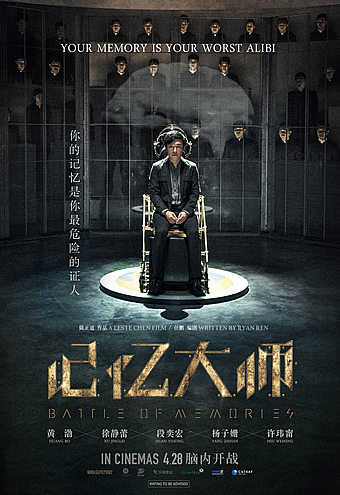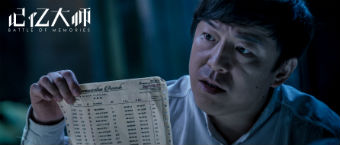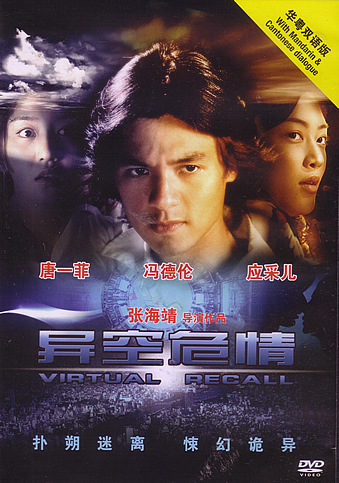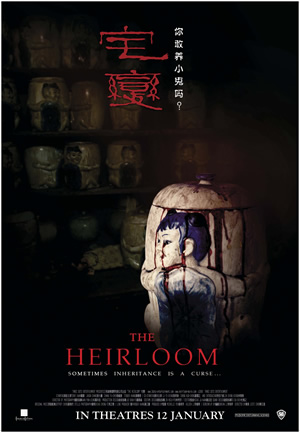BATTLE OF MEMORIES (记忆大师) (2017)
Genre: Sci-Fi/Thriller
Director: Leste Chen
Cast: Huang Bo, Xu Jinglei, Tiffany Ann Hsu, Duan Yihong, Yang Zishan
Runtime: 2 hrs
Rating: PG13 (Some Violence)
Released By: mm2 Entertainment, Clover Films and Cathay-Keris Films
Official Website:
Opening Day: 28 April 2017
Synopsis: What will happen if your brain locates a memory that doesn’t belong to you? In 2019, the “Master of Memory” has been popularized worldwide. This is a surgery that can manipulate one’s memories and takes away any emotional trauma in efforts to aid people in moving on. Feng, a prestigious novelist, is entangled in a painful divorce and chooses to erase the memories of his marriage. When he tries to recover his them, he finds himself in the mind of a serial killer. He reaches out to a police inspector, Shen. Both relying on their deductions of these dangerous secrets, they have 72 hours to find the killer. Otherwise, these horrifying memories will be etched to Feng’s mind forever.
Movie Review:
Despite its Chinese title Jiyi-Dashi, which in fact literally translates to “Master of Memory”, there is nothing in this film about brainiacs gifted with the cerebral aptitude for storing or recalling long strings of data or figures. A loose follow up to 2014’s The Great Hypnotist (or Cuimian-Dashi, literally “Master of Hypnotism”) and the second part in up-and-coming Taiwanese director Leste Chen’s planned Master (Dashi) trilogy, Battle of Memories is a sci-fi crime thriller that, apart from genre and namesake, bears scant resemblance in storyline to its predecessor.
Debatable misnomers aside, the film starts off chillingly enough – we hear a girl whispering numbers to herself in a dark dwelling, seemingly counting down to some event that we are not privy to. A neighbour, concerned about the raucous quarrels that have emerged from the girl’s apartment just moments before, helpfully knocks on the door to ask if everything is ok with her parents. The girl falteringly answers that it is so and shuts the door, but clearly nothing is ok, because we then see two bloodied bodies sprawled at the base of a staircase in her house.
Fast forward and we meet the protagonist Feng (played by Huang Bo), a best-selling author of meek temperament, who is in the midst of painful divorce proceedings with his wife Zhang Daichen (played Xu Jinglei). Driven by a desire to forget the past he shares with her, he employs the medical services of an institute to perform the cutting-edge surgery in question, which niftily elicits the relevant memories and distils them into a minidisc-type token.
Except of course that there are limitations to the technology: the procedure focuses on removing the emotions associated with the traumatic memories rather than deleting the culpable events recorded by the brain. Any post-op recollections are then experienced detachedly by its clients as dispassionate observers. In addition, the surgical operation is only somewhat reversible and any memories that are re-imported become permanent after 72 hours.
For reasons that are later revealed, Daichen insists that Feng reinstall the memories, which he does. It slowly emerges that his token has been inadvertently swopped with that of a killer, as harrowing images of crimes scenes start to manifest themselves in his mind. He helpfully volunteers the information to the police, in particular a certain Inspector Shen (played by Duan Yihong), who begins to believe Feng’s accounts but is ostensibly limited by the lack of concrete evidence to take any action.
As the fuzzy transplanted memories start to gain clarity (which range from somewhat unsettling scenes of domestic altercations to downright eerie depictions of a pallid body submerged in a bathtub and of another lady being shoved down a flight stairs), Feng is convinced that the mysterious killer (who has access to his extracted memories) will target his wife next and decides to takes things into his own hands. The film escalates into full-blown whodunit thriller mode, laying some red herrings along the ride for audiences but never easing on building up the dread, as the fragments of the killer narrative coalesce into a climatic end.
So how does it all fare? Comparisons of how this movie measures up against other films of the Hollywood sci-fi tradition seem inevitable, given that the latter has had a far more established history than that in the mainland Chinese film industry, and that many Chinese productions of such scale have been plagued by the ignominy of unoriginality or even plagiarism accusations. The comparisons are a fact that director Leste Chen himself seems resigned to, judging from recent media interviews.
Truth be told, there are aspects of the film’s premise that recalls modern genre classics such as Christopher Nolan’s Memento (in the way unfamiliar memories are progressively pieced together in order to trace the identity of a certain murderer and the stylistic interspersing of colour and black-and-white sequences) and Michel Gondry’s Eternal Sunshine of the Spotless Mind (in the way its characters undergo similar memory erasure procedures to forget about their failed romance).
To Chen’s credit however, he seems to have taken into consideration the criticism levelled upon the previous instalmentThe Great Hypnotist (which critics claimed was a rip-off of M. Night Shyamalan’s The Sixth Sense) and crafted something here that still feels like a breath of fresh air. Instead of focusing on the technical aspects of the sci-fi element, Chen instead grounds his efforts in telling the story, and it pays off quite handsomely on the big screen. The film cleverly steers you in misleading ways, even making you work to think you’ve got the identity of the killer all figured out, when things may not be as they seem (just like a good whodunit should). And even if you’ve got your bets right, certain details about the murderer’s motives and modus operandi for his or her next intended slaughter are left only to the very end.
While the material is hardly ground-breaking (at least by the Hollywood yardstick), there also appears to be a deliberate effort at subtle social commentary to remind you that the context is still quintessentially Chinese: a mother-in-law pressures her daughter-in-law to have children (with heart-breaking consequences); the sense of resignation with regards to laws protecting minors; an abusive husband who has to seek permission from his mother-in-law to bring his wife home.
Rather than resort to cheap jolts and jump scares, Chen also manages to weave a richly macabre atmosphere by combining a grim, neo-noir aesthetic with plot-driven tension. Some scenes are outright visceral and may be difficult to stomach (including the use of a razor blade in creative ways to break out of jail), but they all work in keeping audiences at the edge of their seats. The result of all the above? A satisfying piece that teases the brain as much as it gratifies in terms of visuals.
In terms of acting, it is clearly the leading men who steal the limelight. Huang Bo proves his mettle as one of the biggest names in mainland China today by fully displaying the range he is capable of: he is equally adept as docile goody-two-shoes novelist as he is in his transformation to raging beast on the loose. Duan Yihong also excels as police inspector Shen, well conveying the intensity of his brooding character in an overall compelling performance. One wishes though that the portrayals of the main female characters were more memorable, especially that of the doctor Chen Shanshan (played by Yang Zishan), which felt a little too subdued for such a pivotal role in the plot.
While not perfect, all things taken into consideration, Battle of Memories is a solid piece of entertainment that reminds us that not enough Chinese movies have been made in the same thematic vein, and that given the right budget, production values and attention to storytelling, there is no reason why Chinese productions should be seen as inferior to their Hollywood counterparts. If the battle for audiences continues to head in this encouraging direction, we want in.
Movie Rating:




(A damning indictment on the far-reaching consequences of domestic violence, this crime thriller is an all-round exciting ride and a breath of fresh air among Chinese films. Watch it)
Review by Tan Yong Chia Gabriel
You might also like:

Movie Stills








-2april2015 (3).jpg)

